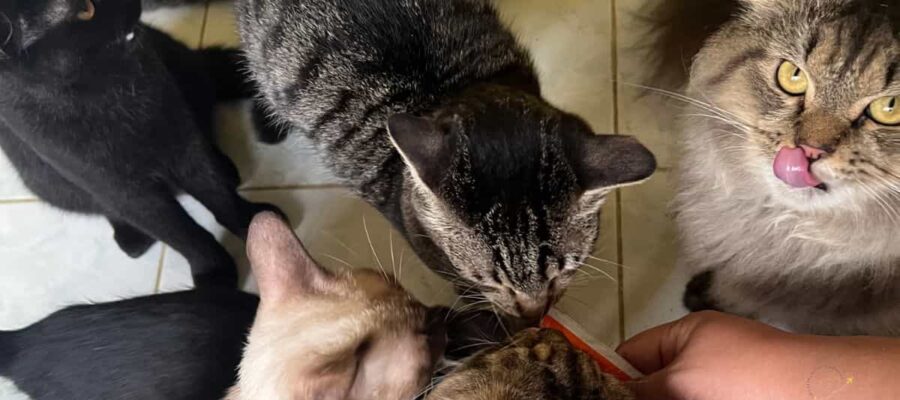Cats have long been cherished as beloved companions in households around the world. From their playful antics to their soothing presence, cats offer a wide range of benefits for their owners.
If you’re considering adopting a feline friend, you may be wondering what the benefits of having a cat are. Whether you’re seeking emotional support, companionship, or even health benefits, having a cat can enrich your life in more ways than one.
Today we’ll explore the many advantages of owning a cat, diving into the emotional, psychological, and physical perks that come with sharing your home with these furry companions.
1. Emotional Benefits of Having a Cat
a. Unconditional Love and Companionship
One of the primary reasons people choose to adopt cats is for the companionship they provide. Cats may have a reputation for being independent, but they often form deep bonds with their owners. When you come home after a long day, your cat is likely to greet you with purring, head bumps, or simply curl up next to you. This sense of companionship is invaluable, especially for those who live alone or experience feelings of loneliness.
b. Stress Relief and Emotional Support
The calming presence of a cat can be a powerful stress reliever. Petting a cat has been shown to lower levels of the stress hormone cortisol, helping you relax and feel more at ease. Cats are also sensitive to their owners’ emotions and may offer comfort when you’re feeling down or anxious. Many people find that their cat’s purring has a therapeutic effect, helping them unwind after a tough day.
c. Boost to Mental Health
Owning a cat can positively impact your mental health. Studies have shown that interacting with pets, including cats, can reduce symptoms of depression, anxiety, and even PTSD. The simple act of caring for a pet gives you a sense of responsibility and purpose, which can help improve overall mental well-being. Cats are often intuitive and can sense when their owner is in need of emotional support, making them ideal companions for those who struggle with mental health challenges.
2. Physical Health Benefits of Owning a Cat
a. Lower Risk of Cardiovascular Disease
Believe it or not, one of the significant benefits of having a cat is a potential reduction in the risk of heart disease. Studies have shown that cat owners are less likely to suffer from cardiovascular issues, such as heart attacks and strokes. The relaxation and calm that comes from spending time with your cat may lower blood pressure and cholesterol levels, contributing to a healthier heart.
b. Petting a Cat Reduces Blood Pressure
The act of petting a cat can have a profound effect on your physical health, particularly when it comes to lowering blood pressure. The rhythmic motion of stroking a cat’s fur is not only soothing for the cat but also helps lower your own blood pressure, reducing the risk of hypertension-related issues.
c. Allergy Prevention for Kids
Interestingly, growing up with a cat in the household can help children develop stronger immune systems. Children who are exposed to cats at an early age are less likely to develop allergies later in life. This exposure to pet dander helps their immune system become more resilient and better equipped to handle allergens in the environment.
3. Cats Are Low-Maintenance Pets
a. Independent Nature
One of the greatest benefits of having a cat is that they are relatively low-maintenance compared to other pets, such as dogs. Cats are naturally independent creatures that require less hands-on attention. While they love affection, they also enjoy spending time alone, which makes them ideal for people with busy schedules. Unlike dogs, you don’t need to walk them multiple times a day—they’re content to explore their surroundings or nap in a sunny spot while you’re away.
b. Easy Litter Training
Cats are instinctively clean animals and are generally easy to litter train. Most kittens learn to use the litter box at an early age, and adult cats typically require little to no training when it comes to using one. Once your cat is litter trained, maintaining a clean space for them is as simple as regularly cleaning their litter box. I personally use Feline Fresh for my litter sand to avoid the rancid smell of their poop and urine.
c. No Need for Frequent Grooming
Cats are meticulous groomers, and they spend a large part of their day cleaning themselves. This means you don’t need to worry about frequent baths or grooming sessions like you would with some other pets. While regular brushing can help reduce shedding and prevent hairballs, most cats are perfectly capable of maintaining their own hygiene.
4. Cats Provide Entertainment and Joy
a. Playful Nature
Despite their calm and independent demeanor, cats are incredibly playful animals. Their curiosity and agility make them natural hunters, and they love engaging in activities that allow them to explore, climb, and chase. Whether it’s batting at a toy mouse or sprinting after a laser pointer, cats are always ready to put on a show and provide endless entertainment.
b. Quirky Behaviors That Make You Laugh
Cats are known for their quirky and often hilarious behaviors. From sitting in the strangest positions to suddenly darting around the house for no apparent reason, cats have an innate ability to make us laugh. Watching a cat’s antics is a great way to lighten the mood and boost your spirits, contributing to your overall happiness.
5. Cats Can Help You Build Social Connections
a. Conversation Starters
Owning a cat can be an excellent conversation starter, especially among fellow cat lovers. Sharing stories, photos, and experiences about your pet can help you connect with others who share a love for animals. Whether you’re meeting new people at a social event or bonding with neighbors, having a cat often leads to interesting conversations and can help foster new friendships.
b. Online Communities and Support Groups
The internet is filled with vibrant communities of cat lovers who share advice, stories, and tips on cat care. If you’re looking for connection or support, joining an online cat community can be a great way to meet like-minded individuals. You can exchange pet-care tips, share photos of your furry friend, and even seek advice from seasoned cat owners.
6. Cats Can Improve Sleep Quality
a. Calm Bedtime Companions
Many cat owners report that their pets improve the quality of their sleep. Cats often enjoy snuggling up with their owners, providing warmth and comfort. The soothing sound of a cat’s purr can have a relaxing effect, helping you drift off to sleep more easily. Having your cat as a bedtime companion can also alleviate feelings of loneliness, especially for those who live alone.
b. Reduced Nighttime Stress
Cats tend to have a calming presence that can reduce nighttime stress and anxiety. Their relaxed demeanor and ability to find comfort in the simplest things can remind you to slow down and enjoy the peaceful moments before bed. Unlike dogs, which may need to be let out at night, cats are content to settle in and sleep through the night, making them ideal for owners seeking uninterrupted rest.
Final Thoughts: The Benefits of Having a Cat
There’s no doubt that owning a cat comes with a wide range of benefits. From the emotional and physical health advantages to the joy and entertainment they bring, the benefits of having a cat are numerous. Cats offer companionship, stress relief, and even improve mental well-being, all while being low-maintenance and independent pets. If you’re considering adopting a pet, a cat may just be the perfect addition to your household.
Whether you’re seeking a calm companion or a playful friend, cats provide an abundance of love, happiness, and health benefits that can enrich your life for years to come.
FAQS
1. What are the emotional benefits of having a cat?
Cats provide companionship, reduce feelings of loneliness, and help relieve stress and anxiety. Their calming presence and affectionate behavior can boost mental health, and many cat owners find comfort in their purring and playful nature.
2. How do cats improve physical health?
Owning a cat can lower your risk of cardiovascular disease by reducing stress and lowering blood pressure. Petting a cat also releases relaxation hormones, contributing to better heart health, and having a cat in the home can help children develop stronger immune systems.
3. Are cats low-maintenance pets?
Yes, cats are generally low-maintenance pets. They are independent, easy to litter train, and self-grooming. Unlike dogs, they do not require daily walks, making them ideal for people with busy lifestyles or limited space.
4. Can having a cat help reduce stress and anxiety?
Yes, studies show that spending time with a cat can reduce stress and anxiety. Petting a cat can lower cortisol levels, the hormone associated with stress, and their calming presence offers emotional comfort during tough times.
5. Do cats help with sleep quality?
Many cat owners report that their pets improve sleep quality by providing warmth, companionship, and a sense of calm. The sound of a cat’s purr can have a soothing effect, helping owners fall asleep more easily and reducing nighttime stress.





